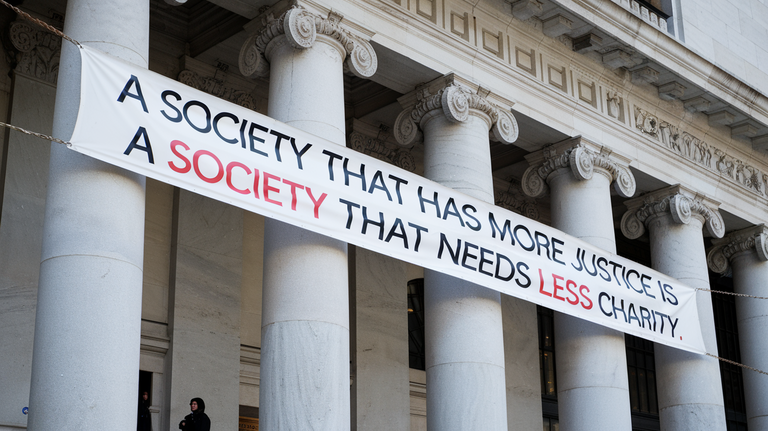In the annals of human civilization, the pursuit of a just society has been an enduring aspiration. A just society, one characterized by fairness, equity, and the impartial application of laws, embodies the ideals of human dignity and social harmony. It is a society where the scales of opportunity are balanced, where every individual, regardless of their background, has the chance to flourish and reach their full potential. Such a society, built on the bedrock of justice, fosters an environment where the need for charity diminishes, replaced by a sense of collective responsibility and shared prosperity. This essay delves into the profound connection between justice and charity, exploring how a society that prioritizes justice creates a virtuous cycle that reduces reliance on charitable acts.
At its core, justice is about ensuring that every individual receives what they are due, whether it be fundamental rights, access to opportunities, or protection from harm. A just society upholds the rule of law, guarantees equal treatment under the law, and provides mechanisms for redress when these principles are violated. It recognizes the inherent worth of every individual and strives to create an environment where everyone can thrive, regardless of their social status, economic background, or any other arbitrary characteristic.
Charity, on the other hand, is an act of benevolence, a voluntary giving of resources or assistance to those in need. While charity is often lauded as a noble virtue, it also serves as a stark reminder of the systemic inequalities and injustices that persist in society. Charity, in many ways, is a band-aid solution, addressing the symptoms of injustice rather than its root causes.
In a society where justice prevails, the need for charity diminishes significantly. This is because a just society addresses the underlying structural issues that create poverty, inequality, and social exclusion. It ensures that basic needs are met, opportunities are accessible, and individuals are empowered to shape their own destinies. In such a society, the reliance on charitable acts becomes less necessary, as individuals are equipped with the tools and resources they need to thrive on their own.
A just society fosters a sense of collective responsibility. When individuals feel that they are part of a fair and equitable system, they are more likely to contribute to the well-being of their community. This sense of shared responsibility leads to a greater willingness to support social programs, invest in public infrastructure, and create opportunities for those who are less fortunate.
Moreover, a just society promotes social cohesion and reduces social unrest. When people feel that they are being treated fairly and that their voices are heard, they are less likely to resort to violence or other forms of dissent. This creates a more stable and harmonious society, where resources can be directed towards development and progress, rather than towards maintaining order and suppressing dissent.
In conclusion, the pursuit of justice is not merely a moral imperative; it is also a pragmatic strategy for creating a more prosperous and equitable society. A society that prioritizes justice creates a virtuous cycle where the need for charity diminishes, replaced by a culture of shared responsibility and collective well-being. It is a society where individuals are empowered to reach their full potential, where communities thrive, and where the human spirit flourishes.
As we strive to build a better world, let us remember that justice is not just an abstract ideal; it is the foundation upon which a truly prosperous and harmonious society is built. By prioritizing justice, we can create a world where charity becomes less of a necessity and more of a choice, a world where compassion and generosity flow freely, not out of obligation, but out of a genuine desire to uplift others and contribute to the common good.







